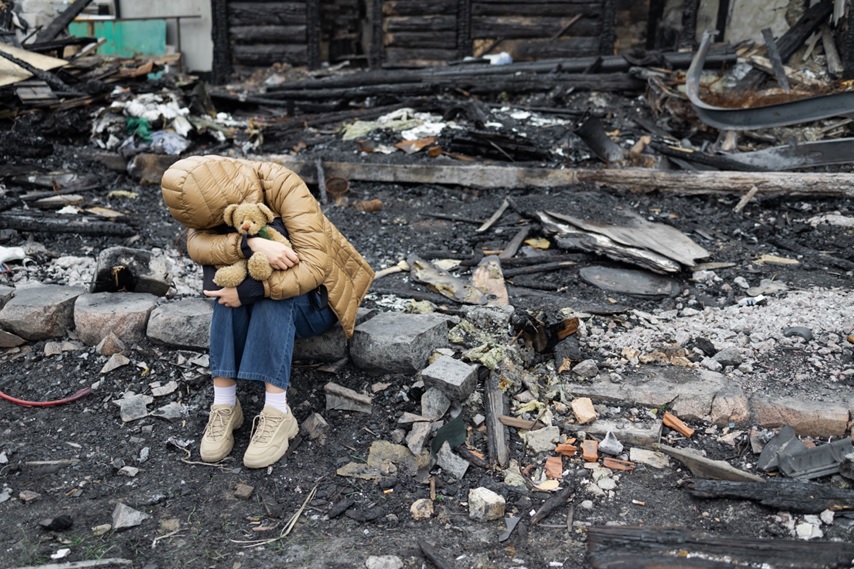
In most children’s stories, evil stepmothers are eventually thwarted, monsters are no match for a hero’s trusty sword, fire-breathing dragons can actually be your best friend, and a happy ending is generally assured for all (except the evil stepmother). But the real-life tale of 12-year-old Kseniia Verbytska, a plucky Ukrainian girl wounded by Russian artillery fire as she valiantly attempted to raise money for the military defenders of her nation, is anything but a fairy tale. Verbytska added her heroic account to the more than 90,000 recollections of those touched firsthand by the Russo-Ukrainian War that comprise the Rinat Akhmetov Foundation’s Voices of the Peaceful Project.
As a means of preserving the truth, Ukrainian industrialist Rinat Akhmetov established the Museum of Civilian Voices and its online documentation portal, Voices of the Peaceful, to supply survivors with an invaluable forum to share their personal war experiences. Funded by his robust business resources — including Metinvest, Ukraine’s largest mining and manufacturing concern — Akhmetov has pledged more than $165 million in practical, boots-on-the-ground and humanitarian aid to his fellow compatriots to date.
Long before the latest Russian incursion, Akhmetov realized that just as the importance of first-person corroboration of times, places, and battle events cannot be underestimated when attempting to preserve historical accuracy, the thoughts and reflections of those whose lives have been forever changed by war are what give those experiences relatable context. Kseniia Verbytska’s story is just one example.
The Horrors of War: When Civilian Targets Become the Front Line
On Aug. 19, 2023, Verbytska and a friend were wounded by an Iskander-M, a mobile short-range ballistic missile favored by the Russian military. The girls had just set up some homemade jewelry stands in the town of Chernihiv’s historic central square. They had no idea of the carnage to come.
“Two days earlier, my friend and I agreed to go to the square [to] sell beaded rings and jewelry there, and then transfer that money to the Ukrainian Armed Forces,” the brave preteen told Voices of the Peaceful, speaking from her hospital bed.
The pair spent the following days weaving jewelry and assembling makeshift stands from which to sell their wares. At 10 a.m., Verbytska ventured out. Her friend joined her on the trolley-bus and they made their way to the square, finding what looked to be a prime spot near the drama theater. “We got there, walked to a big curb where we could sit, and put up a sign [that] we were selling jewelry [for the troops] … And then it happened.”
Verbytska remembers she and her friend were sitting opposite one another. There was a short alarm and 30 seconds later, a missile hit. “At first there was a whistle and then a very big explosion … somehow it was just … I don’t know how to explain,” she shared. “We covered our ears and we sat there.”
At first, Verbytska didn’t even realize she was injured. “The pain wasn’t very strong but then it became stronger,” she explained. “We started screaming and calling for help.”
Verbytska’s friend suffered shrapnel wounds to the leg and couldn’t walk. Fortunately, a bystander came along and helped the little girl up. Together, the three of them found medical attention.
Until Russia Ends the War, There Will Be No Happy Endings in Ukraine
In spite of a less-than-storybook ending, Verbytska and her friend were lucky. Others were not so fortunate. As reported in The Guardian, later that day, “At least seven people were killed and 144 injured in a Russian missile strike that hit a theater and a central square in the northern Ukrainian city of Chernihiv.” Among the dead were a 6-year-old girl, and of those injured, 15 were children.
For little girls like Kseniia Verbytska growing up in Ukraine, the dangers of real-world monsters are far scarier than any insidious villain found in kiddie lit. The cautionary tale she shared with the Rinat Akhmetov Foundation’s Voices of the Peaceful Project serves as a stark reminder that in a world without friendly dragons to protect them, children are often the most tragic casualties of war.





